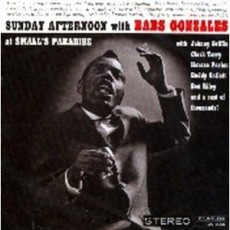
Daily Dose Of Jazz…
Babs Gonzales was born Lee Brown on October 27, 1919 in Newark, New Jersey and he and his brothers were all called Babs. He studied piano at a young age and learned to play drums. He sang in clubs; wore a turban in Hollywood in the late 1940s, calling himself Ram Singh; worked as a chauffeur for Errol Flynn; called himself Ricardo Gonzales (Mexican rather than ‘Negro) so as to get a room in a good hotel.
Gonzales was a pioneer in the scat vocalese style who did what he could to popularize bop. He had stints with Charlie Barnet and Lionel Hampton’s big bands, and then led his own group Three Bips & a Bop from 1946 to1949, recording for Blue Note during 1947- 1949, including the earliest version of “Oop-Pop-A-Da”, later covered by Dizzy Gillespie. Among his sidemen on these dates were Tadd Dameron, Tony Scott, Roy Haynes, James Moody, J.J. Johnson, Julius Watkins, Art Pepper, Wynton Kelly, Don Redman and Sonny Rollins making his recording debut.
When Capitol Records decided to flirt with bop around 1950, Babs was voicing the sessions. He worked with James Moody; recorded with Jimmy Smith, Johnny Griffin, and Bennie Green, who was one of the first Americans to perform at Ronnie Scott’s club in London as early as 1962. Spending a lot of time in Europe Babs was considered quite a colorful jazz personality there. A hard-working promoter of jazz, he also published three autobiographies; “I Paid My Dues — Good Times”, “No Bread” and “Movin’ On Down De Line”.
Babs Gonzales, who used his voice as a musical instrument incorporating slang, strange and funny new words in rhythmically complex phrases died on January 23, 1980. He would later become more of a cult figure, leaving a recorded legacy that is considered collector’s items for the die-hard bop aficionados. Though his place in jazz history is often blurred, he was present during the bop revolution and was ever the consummate hipster.
More Posts: vocal


